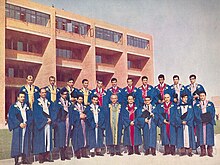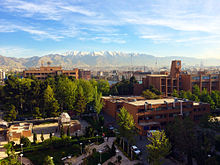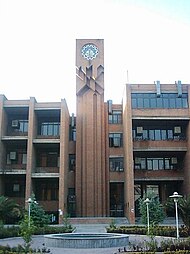Sharif University of Technology
It has been suggested that Sharif University of Technology International Campus – Kish Island be merged into this article. (Discuss) Proposed since September 2024. |
Dāneshgāh-e sana'ti-e sharif | |
 | |
Former name | Aryamehr University of Technology |
|---|---|
Motto in English | The Place of Intellectuals and Elites Transforming National Talents into Global Bests |
| Type | Public Research University |
| Established | 1966[1] |
| Endowment | US$ 0.5 billion (2021)[2] |
| President | Abbas Mousavi[3] |
Academic staff | 460 (Full-time) (Fall 2022) |
Administrative staff | 395 (2021) |
| Students | 10,812 (Fall 2022) |
| Undergraduates | 5,659 (2021) |
| Postgraduates | 3,390 (2021) |
| 989 (2021) | |
| Location | , , 35°42′6.47″N 51°21′5.18″E / 35.7017972°N 51.3514389°E |
| Campus | Urban, 74 acres (29.9 ha) |
| Newspaper | Sharif Daily Scientia Iranica |
| Colors | Dark Blue |
Sporting affiliations | 19 sports IUSF |
| Website | en.sharif.edu |
Sharif University of Technology (SUT); (Persian: دانشگاه صنعتی شریف, romanized : Dāneshgāh-e sana'ti-e sharif) is a public research university in Tehran, Iran. Nicknamed "the MIT of Iran",[citation needed] it is widely considered to be the nation's most prestigious and leading institution for science, technology, engineering, and mathematics (STEM) fields. Every year, the smartest and the most prospective students in Iran, ranked according to the results of the Iranian University Entrance Exam, choose to study at SUT at Bachelor's, Master's as well as PhD levels. For those students who wish to study STEM related fields, especially the most popular ones such as Computer engineering, Electrical engineering and Mechanical engineering, Sharif University of Technology is the toughest Iranian university to get admission to.
Established in 1966 under the reign of Mohammad Reza Shah Pahlavi, it was formerly named the Aryamehr University of Technology (Persian: دانشگاه صنعتی آریامهر, romanized: Dāneŝgāhe Sannatiye Āryāmehr) and for a short period after the 1979 revolution, the university was called Tehran University of Technology. Following the revolution, the university was named after Majid Sharif Vaghefi.
Today, the university provides both undergraduate and graduate programs in 15 main departments. The student body consists of about 6,000[4] undergraduate students and 4,700[4] graduate students from all the 31 provinces of Iran. Funding for Sharif University is provided by the government and through private funding. Undergraduate admission to Sharif is limited to the top 800 of the 500,000 students who pass the national entrance examination administered annually by the Iranian Ministry of Science, Research and Technology.[5]
In the 2013 Academic Ranking of World Universities Engineering/Technology and Computer Sciences rankings, SUT was ranked 5th in the Middle East.[6] It is in the top 251–275 universities in the world and 37th in Asia in the 2014 Times Higher Education World University Rankings.[7][8] In the 2014 Times Higher Education top 100 for newer universities (less than 50 years old), SUT ranked 1st in the Middle East, 6th in Asia, and 27th in the world.[9] In 2023, according to US News, the world ranking of this university reached 598.[10][11]
History
[edit]
The university was founded in 1966 with the name Aryamehr University of Industry by Mohammad Ali Mojtahedi. At that time, there were 54 faculty members and a total of 412 students who were selected by national examination. Also, only four departments were established: Electrical, Metallurgical, Mechanical, and Chemical Engineering.[12] In 1972, Mohammad Reza Pahlavi appointed Sayyed Hosein Nasr as president of the university with the goal of modeling the school based on the Massachusetts Institute of Technology, but with roots in Iranian culture.[13][14] In 1974 a new campus of the university was established in Isfahan. But later that campus became an independent university, named Isfahan University of Technology (IUT). The emblem of IUT still closely resembles SUT's emblem [citation needed]. Following the revolution, the university was named after Majid Sharif Vaghefi, who was one of the People's Mujahedin of Iran group's leaders who was killed by the members of a splinter group (later renamed to Peykar Organization) who had recently converted from Islam to Marxism and were adamant to forcefully change the Mujahedin's organization's ideology to Marxism.
Currently, the university has about 12,000 students and over 700 faculty members in 16 main departments.[15] During the Mahsa Amini protests in 2022, many students participated, with video footage of the protest and subsequent response by Iranian security forces published first to social media and then by major news organizations. Iranian state news agency IRNA reported that at least 37 students were arrested and most were released shortly afterwards.[16][17][18]
Campuses
[edit]Main campus
[edit]The main campus of the university is located in the Tarasht neighborhood, near Azadi Square, Tehran, Iran. It is located close to the Azadi Tower, which is the symbol of Tehran and one of the main transportation hubs. The endowment of Sharif University of Technology has been estimated at $25 million.[19]
International campus
[edit]Sharif University also has an International Campus on Kish Island in Persian Gulf. The International Campus of Sharif University of Technology was established in 2005. Today there are two faculties active in this campus: Faculty of Engineering and Science, and Faculty of Management. The campus is currently admitting students for bachelor's, master's, and Ph.D. degrees in engineering courses and a master's degree in management.
Academic profile
[edit]
Profile
[edit]Sharif University was established in 1966 as an Engineering university with departments of Electrical, Metallurgical, Mechanical, and Chemical Engineering.[12]
World rankings
[edit]| University rankings | |
|---|---|
| Sharif University of Technology | |
| Global – Overall | |
| ARWU World[20] | 501–600 (2021) |
| CWTS World[21] | 371 (2021) |
| QS World[22] | 334 (2024) |
| THE World[23] | 401–500 (2022) |
| USNWR Global[24] | 598 (2023) |
In the 2020 Academic Ranking of World Universities[6] (also known as Shanghai Ranking), the university ranked between 501 and 600 in the world and first in Iran. According to the QS Ranking,[25] Sharif University of Technology has stood in the first place of Iran and maintained its international rank 334th. In the 2022-2023 U.S. News & World Report Best Global University Ranking, the university ranked 598th in the world.

Student life
[edit]Political activities
[edit]Through the student political movement after the 2nd of Khordad Movement, Sharif students were also actively involved. The major groups with political intentions at Sharif, during 1997–2003, were students Basij and the Association of Muslim students, briefly called Anjoman (Association). Most other smaller groups were allies of either Basij or Anjoman. Basij was a serious opposer of Mohammad Khatami, the president of the time. Whereas, Anjoman was a loyal follower. There have been several clashes between member students of the two groups. Free speech tribunes, occasionally end in harsh quarrel-like debates. However, the major clash between Anjoman and Basij occurred while the student movement was in silence in most other universities. In 2006, a serious controversy resulting in physical tensions, occurred after Basij attempted to bury bodies of unknown martyrs of the Iran–Iraq War at the universities' Mosque court.[26]
Sharif University of Technology Association (SUTA)
[edit]This non-profit organization is registered in the state of California, USA and has many chapters and affiliates around the world. Its mission is to enhance professional, academic, and social contacts among its membership, and to strengthen the ties between the association members living outside of Iran and the university.[27]
Faculty and alumni
[edit]Chancellors
[edit]- Mohammad Ali Mojtahedi, 1965–1967
- Fazlollah Reza, 1967–1968
- Mohammad Reza Amin, 1968–1972
- Seyyed Hossein Nasr, 1972–1975
- Mehdi Zarghamee, 1975–1977
- Alireza Mehran, 1977–1978
- Hossein Ali Anvari, 1978–1979
- Ali Mohammad Ranjbar, 1979–1980
- Abbas Anvari, 1980–1982
- Ali Akbar Salehi, 1982–1985
- Abbas Anvari, 1985–1989
- Ali Akbar Salehi, 1989–1993
- Mohammad Etemadi, 1993–1995
- Sayed Khatiboleslam Sadrnezhaad, 1995–1997
- Saeed Sohrabpour, 1997–2010
- Reza Roosta Azad, 2010–2014
- Mahmud Fotuhi Firuzabad, 2014–2021
- Rasool Jalili, 2021–2023
- Abbas Mousavi, 2023–present
Notable alumni
[edit]Alumni in academics include the late Maryam Mirzakhani, professor of mathematics at Stanford University and the first woman to be awarded a Fields Medal.
Imprisoned human rights blogger Kouhyar Goudarzi was an aerospace student at Sharif until pressure from state security forces allegedly caused his dismissal.[28] Omid Kokabee, an applied physics and mechanics alumnus,[29] was arrested while visiting Iran during his postdoctoral research in University of Texas at Austin.[30] He was sentenced to 10 years in prison for "communicating with a hostile government" and "illegitimate/illegal earnings."[31]
-
Maryam Mirzakhani: professor of mathematics at Stanford University and the first woman to be awarded a Fields Medal
-
Elshan Moradi: chess grandmaster
-
Ali Daei: former member and later head coach of Iranian national football team
-
Adel Ferdosipour: football commentator
-
Mohammad-Javad Larijani: Iranian conservative politician, mathematical logician, and former diplomat
See also
[edit]- List of Islamic educational institutions
- Higher education in Iran
- Pardis Technology Park
- Shahbal, unmanned aerial vehicle (UAV) developed at SUT
- Iranian Machine Design Competition
References
[edit]- ^ "Sharif University of Technology – Introduction". Archived from the original on 25 December 2018. Retrieved 3 February 2017.
- ^ "Financial information". FarsNews. 10 December 2014.
- ^ "انتخاب ۷نفر از روسای دانشگاهها تایید شد". mehrnews.com (in Persian). 3 March 2024. Retrieved 9 March 2024.
- ^ a b "Archived copy" (PDF). Archived from the original (PDF) on 22 July 2011. Retrieved 2 November 2009.
{{cite web}}: CS1 maint: archived copy as title (link) - ^ "Iran Makes the Sciences A Part of Its Revolution". The Washington Post.
- ^ a b "Academic Ranking of World Universities – 2013". Shanghai Ranking Consultancy. Archived from the original on 6 October 2020. Retrieved 23 August 2013.
- ^ "Sharif University of Technology". Retrieved 3 February 2017.
- ^ "World University Rankings". 13 April 2015. Retrieved 3 February 2017.
- ^ "150 Under 50 Rankings". 13 April 2015. Retrieved 3 February 2017.
- ^ "Sharif University of Technology in Iran - US News Best Global Universities". U.S. News. 27 May 2024.
- ^ team, I. B. R. (27 May 2024). "Discover Sharif University: A Leading Institution in Iran". Iran Brands Review. Retrieved 28 May 2024.
- ^ a b Mirzayi, Mohammad (2005). Sharif University of Technology Booklet (in Persian). Sharif University Press.
- ^ "Biography / Dr. Seyyed Hossein Nasr". Retrieved 28 May 2008.
- ^ Leslie, Stuart W.; Robert Kargon (2006). "Exporting MIT: Science, Technology, and Nation-Building in India and Iran". Osiris. 21 (1): 123. doi:10.1086/507138. S2CID 146272994.
- ^ "Sharif University Introduction". Archived from the original on 25 December 2018. Retrieved 5 December 2020.
- ^ "Iran protests: riot police use teargas on students at Sharif university". the Guardian. 3 October 2022. Retrieved 18 October 2022.
- ^ Rebane, Teele; Ritchie, Hannah; Karadsheh, Jomana; Fox, Kara (3 October 2022). "'It was a warzone.' Iranian security forces beat, shot and detained students of elite Tehran university, witnesses say, as crackdown escalates". CNN. Retrieved 18 October 2022.
- ^ Ershad, Alijani (4 October 2022). "'They shot at us': A Sharif University student recounts 'apocalyptic' repression of protests in Iran". The Observers - France 24. Retrieved 18 October 2022.
- ^ "Sharif University International Campus Website". Retrieved 17 November 2008.
- ^ Academic Ranking of World Universities 2021, Shanghai Ranking Consultancy, retrieved 24 September 2021[permanent dead link]
- ^ CWTS Leiden Ranking 2020, Centre for Science and Technology Studies, Leiden University, retrieved 24 September 2020
- ^ QS World University Rankings® 2022, Quacquarelli Symonds Limited, retrieved 24 September 2021
- ^ World University Rankings 2021, THE Education Ltd, 25 August 2020, retrieved 2 September 2020
- ^ Best Global Universities in Iran, U.S. News & World Report, retrieved 24 March 2022
- ^ "QS World University Rankings". Top Universities. Retrieved 29 December 2020.
- ^ Esfandiari, Golnaz. "Iran: Students Protest Burials Of War Dead On Tehran Campuses". Radiofreeeurope/Radioliberty. Radio Free Europe, Radio Liberty (RFEL). Retrieved 28 May 2008.
- ^ "SUTA Vision and Mission". Retrieved 22 February 2011.
- ^ "Kouhyar Goudarzi: "I Won't Be Released Any Time Soon," Trial Date Unknown". International Campaign for Human Rights in Iran. 12 April 2010. Retrieved 1 January 2012.
- ^ "Omid Kokabee (personal homepage)". Archived from the original on 19 September 2012. Retrieved 12 April 2013.
- ^ Shuster, Mike (7 October 2011). "Iran Charges Student Who Was In the U.S." NPR.
- ^ Maly, David (8 January 2013). "UT student Omid Kokabee gains more international support amid prison sentence". The Daily Texan. Archived from the original on 18 January 2017. Retrieved 12 April 2013.
External links
[edit]- Sharif University of Technology's home page Archived 2 December 2008 at the Wayback Machine







